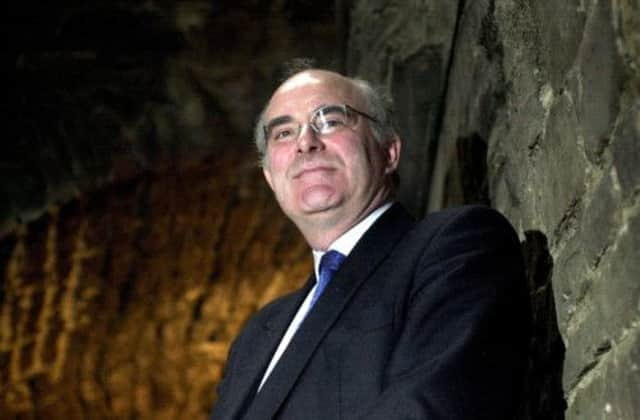Obituary: David McLetchie CBE solicitor and MSP


A Conservative Party activist for 45 of his 61 years, David McLetchie headed the Scottish Conservative Party from 1998 to 2005, in the run-up to and during devolution, and latterly became Tory MSP for the Lothians.
He was also one of the most influential and admired politicians in the new Holyrood parliament. As the first Tory leader north of the Border in devolved Scotland, he was seen and respected as a fighter trying to reverse his party’s horrendous 1997 general election campaign, when no Conservatives were elected to represent Scottish constituencies.
Advertisement
Hide AdAdvertisement
Hide AdFor six years, McLetchie led the party ably: comfortable in the debating chamber, he repeatedly challenged the Labour first ministers and other leading figures from opposing parties, capable finding a turn of phrase that would maximise their discomfort.
Following a series of Labour cabinet reshuffles in 2002, he scathingly suggested that there were “more drop-outs in the Scottish Executive than there were at Woodstock”, while he attacked the Labour administration’s “doing less, better” strategy as: “A completely incoherent approach in which everything is a priority and, as a result, nothing is a priority.”
McLetchie was very much an Edinburgh figure, with a career in the capital as a lawyer and then politician that sprang from his education and upbringing there. He was born in 1952 to parents who had left school at 15. But, believing in the value of education, they wanted to see their son excel and encouraged him on to win a scholarship that took him from Leith Academy to George Heriot’s School. He went on to graduate in Law with honours from the University of Edinburgh in 1974, having only just turned 22 when he got his result.
A staunch Hearts fan and keen golfer, in 1976 McLetchie qualified as a solicitor and was snapped up by Tods Murray WS in the capital, working at its offices on Edinburgh Quay and on Queen’s Street, where he specialised in handling inheritance tax changes brought in by the then Labour government at Westminster. He was made a partner in 1980, when he was 28.
By then he had long been involved in the Young Conservatives – since he was 16 – though with no familial background in activism, he was driven instead by a personal desire to get on in life and better himself. This led him to his first electoral battle, when he was put forward as a Tory candidate for Edinburgh Central in the general elections of 1979, which he lost to Robin Cook.
Though he did not seek election again until devolution 20 year later, during the intervening years McLetchie held a range of senior party roles at both local and national level, including president of the Scottish Conservative and Unionist Association from 1994 until 1997.
He then served on the Strathclyde Commission, set up to reform the party following the Conservative’s disastrous 1997 general election, before finally taking on the Scottish Conservative leadership the following year, and with it the unenviable responsibility of the directing the party’s first Scottish Parliament elections in 1999.
He remained a member of the Scottish Parliament from its inception until his death, either as a directly elected MSP or as a “regional list” member for the Lothians under the proportional representation system.
Advertisement
Hide AdAdvertisement
Hide AdDuring this period, he helped to build on the Tory party’s initial position within Holyrood from a group of MSPs elected on this PR system in its first elections, winning three past-the-post seats four years later, including his own in Edinburgh Pentlands, which he took from future Scottish Labour leader Iain Gray.
It was as Tory leader that McLetchie’s persistent grilling of Labour First Minister Henry McLeish over his Westminster parliamentary expenses was to play a pivotal role in the Labour leader’s departure from the post in 2001. Ironically, McLetchie’s own leadership was ended in 2005, when he was forced to step down following questions over his Holyrood taxi expenses claims.
He spent £11,500 during five years – more than any other MSP – and though he said that the claims were made in good faith, the controversy boiled on and he was forced to step down to limit the impact on the party.
Speaking about the manner of his departure later, McLetchie was philosophical: “I had to take responsibility and it came to the point where my continuing was damaging the party and its prospects.”
Even after standing down as leader, McLetchie remained a leading figure among Scottish Tory party ranks in both Holyrood and among grassroots supporters, whose endorsement in a leadership election was much-valued. Voters in his constituency returned him during the 2007 election, and he retook his seat with a doubled majority and increased share of the vote, as well as taking on the role of Tory whip in Holyrood.
Following the 2011 election, the new Holyrood boundaries saw him lose his Pentlands seat and he reverted back to being a Lothians list MSP, and latterly became the Tory representative on the board of Better Together, the official campaign to keep the Union ahead of the 2014 independence referendum.
He was appointed CBE earlier this year. McLetchie is survived by his wife Sheila, and his son James, from his first marriage to his late wife Barbara, who died of cancer in 1995.